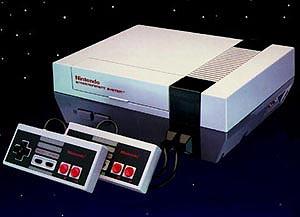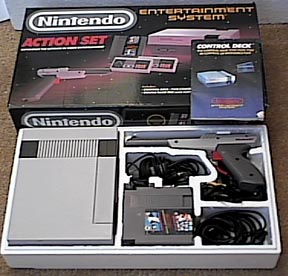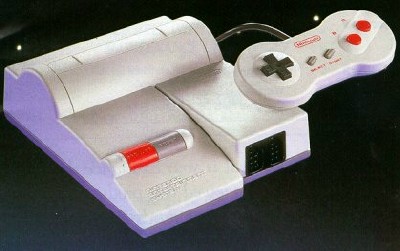
Now You're Playing With Power!
That's right... I mean that's what we were all told growing up in the 80's...
The Nintendo Entertainment System (or more commonly referred to by as the NES
or just Nintendo) was one of the fastest growing video game systems in the 80's.
If you didn't own a Nintendo growing up then you didn't know what you were missing!

In 1984 the future of video games looked bleak. Home
computers were becoming more and more popular, and it seemed as if video game systems were a thing of
the past. Then on October 18th 1985 the Nintendo debuted in the U.S. at the FAO Schwarz Toy Store in
New York City. Around that time Nintendo started making deals with other retailers to market their new
system, the NES...
Promising to buy back all unsold inventory in order to get retailers to take a chance on them, Nintendo
was ready to release their system nationwide in February of 1986. Upon their release Nintendo offered
two different bundles to choose from. One which started at $249 and came with the R.O.B. Robot, two
controllers, a lightgun, and three games. (Gyromite, Duck Hunt, and Super Mario Bros.) The other
package sold for $199 and came with two controllers along with the Super Mario Bros. game cartridge.
The NES was a huge success and was soon outselling competing systems by a ten-to-one ratio.
|
|
|

|

|
|
Nintendo had learned from the mistakes of its predecessors, and put into effect a very strict licensing
system for third-party developers. This helped prevent the over-saturation of games for the system
which was also a contributing factor for the decline of the market in 1984. Nintendo was determined not
to let this happen to their system. Throughout the late '80s, the NES enjoyed tremendous popularity,
blowing all the other systems out of the water. Heavily controlled advertising, distribution, production,
and pricing led to Nintendo's success. Eventually retailers tried to sell unlicensed games and even offer
lower prices than what Nintendo had set fourth. This led to Nintendo withholding shipments to certain
retailers, and began the many lawsuits which eventually led up to investigations by the Federal Trade
Commission.
|
|
|



